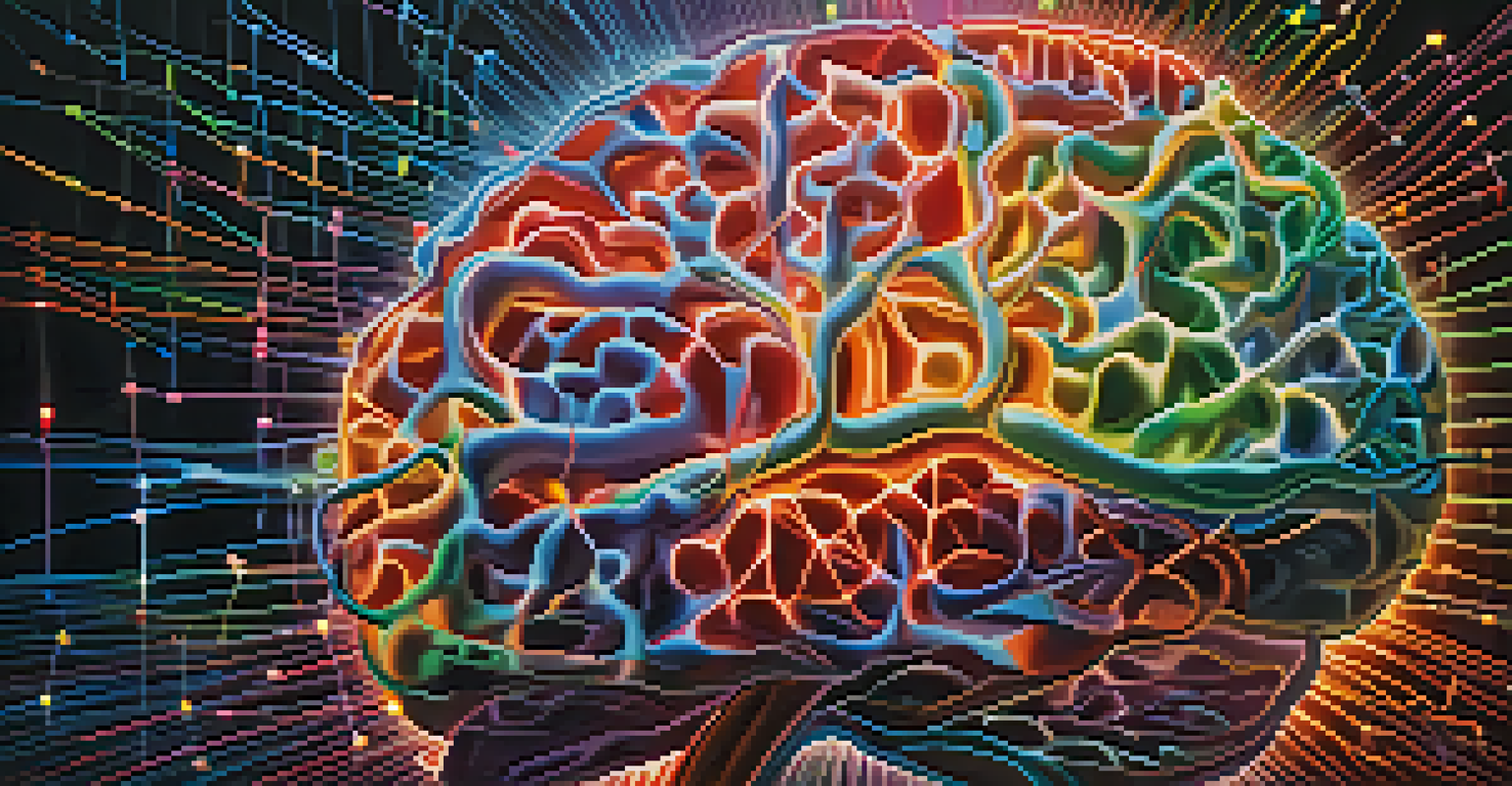Exploring Peyote's Impact on Neuroplasticity and Brain Health

Understanding Neuroplasticity and Its Importance
Neuroplasticity is the brain's remarkable ability to reorganize itself by forming new neural connections. This adaptability is crucial for learning, memory, and recovery from injury. Think of it like a city's traffic system adjusting to accommodate new roads and routes, ensuring smooth travel even when changes occur.
Neuroplasticity is not just a buzzword; it's a fundamental property of the brain that allows us to adapt, learn, and recover.
As we age or experience trauma, our brain's neuroplasticity can diminish, leading to cognitive decline. Enhancing neuroplasticity can help us maintain mental agility and resilience. This is where substances like peyote come into play, with potential effects that may support cognitive function and emotional well-being.
In essence, fostering neuroplasticity is vital for lifelong brain health. By understanding how peyote might influence this process, we can explore new avenues for enhancing mental clarity and emotional stability.
What Is Peyote and Its Traditional Uses?
Peyote is a small, spineless cactus native to Mexico and the southwestern United States. Historically, it has been used for thousands of years in spiritual ceremonies by indigenous peoples. Its psychoactive compound, mescaline, is known for inducing altered states of consciousness, which many believe can facilitate deep introspection and healing.

In these traditional contexts, peyote is often consumed during rituals aimed at enhancing spiritual connection and personal insight. Users report experiencing profound emotional and cognitive shifts, as well as increased awareness of their surroundings. This connection to nature and self can be a powerful catalyst for personal growth.
Neuroplasticity Enhances Brain Health
Neuroplasticity, the brain's ability to reorganize and form new connections, is essential for learning, memory, and recovery from injury.
Understanding peyote's cultural significance helps us appreciate its potential effects on the mind. When exploring its impact on neuroplasticity, we must respect these traditions while examining the science behind its use.
The Science of Mescaline and Brain Function
Mescaline, the primary psychoactive component of peyote, interacts with serotonin receptors in the brain. This interaction can lead to alterations in perception, mood, and cognition, ultimately affecting how the brain processes information. Imagine it as tuning a radio to a different frequency, allowing you to hear a new station more clearly.
The greatest discovery of my generation is that a human being can alter his life by altering his attitudes.
Research suggests that psychedelics like mescaline may promote neurogenesis—the growth of new neurons—which is essential for maintaining a healthy brain. This process can enhance learning and memory capabilities, potentially reversing some cognitive decline associated with aging. It's like giving your brain a fresh start.
The implications of mescaline on brain function could be profound, especially for those seeking alternative therapies for mental health issues. By understanding its effects, we can better appreciate how peyote might influence neuroplasticity and overall brain health.
Peyote and Emotional Regulation: A Closer Look
One of the intriguing aspects of peyote use is its potential for improving emotional regulation. Users often report heightened emotional awareness and a deeper understanding of their feelings. This clarity can lead to healthier coping mechanisms and a more balanced emotional state.
This emotional insight may be linked to the brain's ability to create new neural pathways, allowing individuals to respond to challenges in more constructive ways. Think of it as rewiring the brain's emotional circuitry, helping to form responses that are less reactive and more reflective.
Peyote's Role in Emotional Insight
Peyote may improve emotional regulation by fostering heightened awareness and new neural pathways for healthier coping mechanisms.
By enhancing emotional regulation, peyote may play a role in reducing symptoms of anxiety, depression, and PTSD. This connection between emotional health and neuroplasticity emphasizes the importance of understanding how substances like peyote can support mental well-being.
Exploring Peyote's Impact on Cognitive Flexibility
Cognitive flexibility refers to the brain's ability to adapt to new information and switch between thoughts or tasks. Peyote's influence on neuroplasticity may enhance this cognitive flexibility, allowing individuals to approach problems from different angles. It's akin to having a versatile toolbox, ready to tackle any challenge with the right tool.
Studies have shown that psychedelics can foster creative thinking and open-mindedness. This shift in perspective can be invaluable in personal and professional settings, where innovative solutions are often needed. By expanding our cognitive horizons, peyote might help us think outside the box.
Ultimately, improving cognitive flexibility through peyote could lead to better decision-making and problem-solving skills. This capability is essential for navigating life's complexities and embracing change with confidence.
Potential Risks and Considerations of Peyote Use
While peyote shows promise in supporting neuroplasticity and brain health, it's essential to approach its use with caution. Like any substance, peyote can have side effects, including nausea, anxiety, and altered perceptions that may not be suitable for everyone. It's crucial to consider these risks before embarking on a peyote experience.
Moreover, the legal status of peyote varies widely, and in some places, it may be illegal to possess or use. Understanding the legal and health implications is vital for responsible usage. Always consult medical professionals or knowledgeable guides when exploring psychedelics.
Research on Peyote's Therapeutic Potential
Ongoing studies are investigating peyote's effects on neuroplasticity, which could lead to innovative treatments for mental health issues.
By being aware of the potential risks associated with peyote, individuals can make informed decisions while considering its therapeutic benefits. Striking a balance between exploration and caution is key to maximizing the positive effects on brain health.
The Future of Peyote Research in Neuroscience
As interest in psychedelics grows, researchers are increasingly exploring the therapeutic potential of peyote and mescaline. Ongoing studies aim to uncover the long-term effects of peyote on neuroplasticity and mental health. This scientific inquiry could pave the way for new treatments for various psychological disorders.
The future of peyote research holds promise for enhancing our understanding of the brain's capabilities. By studying how psychedelics impact neuroplasticity, we can develop innovative approaches to mental health care. Imagine a world where therapies harness the brain's natural ability to heal and adapt.

Ultimately, this research could lead to a paradigm shift in how we view and treat mental health issues. By integrating ancient wisdom with modern science, we can uncover new pathways for healing and growth.